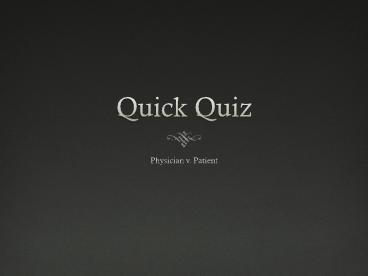Quick Quiz - PowerPoint PPT Presentation
Title:
Quick Quiz
Description:
* Informed Consent The classification of people as children, intellectually disabled, ... Competence Voluntariness Disclosure Understanding Dignity * Paternalism v. – PowerPoint PPT presentation
Number of Views:127
Avg rating:3.0/5.0
Title: Quick Quiz
1
Quick Quiz
- Physician v. Patient
2
Truth Confidentiality
- Which definition did Garrett use for lying?
- Speech against the mind
- Speech intended to deceive others
- Uttering falsehoods when others reasonably expect
truth - Uttering falsehoods against the mind
- Uttering falsehoods in general
3
Truth Confidentiality
- A Natural Secret is
- Something kept secret about your nature
- Something that would naturally harm a person if
divulged - Something kept secret about your body
- Something that would alter your nature if known
- Something that is unnatural to know
4
Truth Confidentiality
- What is bad about revealing a promised secret?
- Revelation treats promisee as a means only, not
as an end - Revelation entails harmful effects
- Breaking promises is only bad if it has harmful
effects - A and B
- B and C
5
Truth Confidentiality
- If the physician says I am going to prescribe
something that often helps in these cases and has
no bad side effects, but is in fact prescribing
a sugar pill (which does often help and has no
bad side effects), the physician - has not lied because the sentence uttered is true
- has not lied because the patient believes what
the doctor wants them to believe - has not lied because the patient believes the
truth - has lied because the patient concludes what the
doctor intends and knows to be false (this drug
will help me) - has lied because it is never right to mislead
someone
6
Truth Confidentiality
- A secret is knowledge that a person has a right
or obligation to conceal, is - a mistaken definition because some secrets are
just beliefs - a mistaken definition because some secrets are
wrong - a mistaken definition because secrets are always
wrong - a correct definition because its in the book
- a correct definition because wrongfully held
secrets are called something else
7
Truth Confidentiality
- A Tarasoff duty is a duty to
- Share pregnancy information with parents of
minors - Tell the truth to terminally ill patients
- Suspend judgment about lying co-workers
- Protect your employer by concealing malpractice
- Warn third parties of threats against them
8
General Biomedical Ethics
- The main goal of health care is
- extend life
- alleviate suffering
- optimize happiness
- A, B, and C are co-equal
- Who knows?
9
Informed Consent
- The classification of people as children,
intellectually disabled, or the pleasantly
confused - Tells us they are not suited to give informed
consent - Tells us they can never be guilty of negligence
- Tells us nothing about their ability to consent
- Tells us little about their ability to consent
- Is always illegitimate and degrading to persons
10
Informed Consent
- Among the competing rules for determining what
information is needed in informed consent,
Garrett likes - Patient preference and professional custom
- Patient preference and prudent person
- Prudent person and subjective disclosure
- Professional custom and subjective disclosure
- None of the rules rules are too limiting
11
Informed Consent
- The overarching, important consideration
governing the information in informed consent is - It must be strictly medical
- It must be communicated free of emotion
- It must understood by the patient
- It must be delivered in writing
- It must be technically accurate
12
Informed Consent
- Coercion and Undue Influence are thought to ruin
the ability to give informed consent because they
interfere with - Competence
- Voluntariness
- Disclosure
- Understanding
- Dignity
13
Paternalism v. Autonomy
- Paternalism, weak or strong, is considered by
both Vaughn and Garret to be - A guide to treating the incompetent
- A guide to treating the competent
- To be avoided if possible
- B and C
- A, B and C
14
Paternalism v. Autonomy
- Paternalism trying to benefit a patient
irrespective of or contrary to - a parents wishes
- a fathers wishes
- that patients wishes
- that patients wishes, only if competent
- a physicians wishes
15
Paternalism v. Autonomy
- Therapeutic Privilege is
- The patients right to the latest therapies
- The doctors duty to use the latest therapies
- The doctors right to deceive a patient for their
own good - The patients duty to refuse therapies they
cannot afford - The privilege to use therapeuts
16
Paternalism v. Autonomy
- According to the Garrett book, strong paternalism
is justified for the government to - Protect the rights of others
- Protect the patient from physical harm
- Protect a patient from financial harm
- Protect an overriding state interest
- Protect a hospital from liability
17
Answers
- 2C, 3B, 4D, 5D, 6B, 7E, 8E, 9D, 10C, 11C, 12B,
13E, 14C, 15C, 16D































